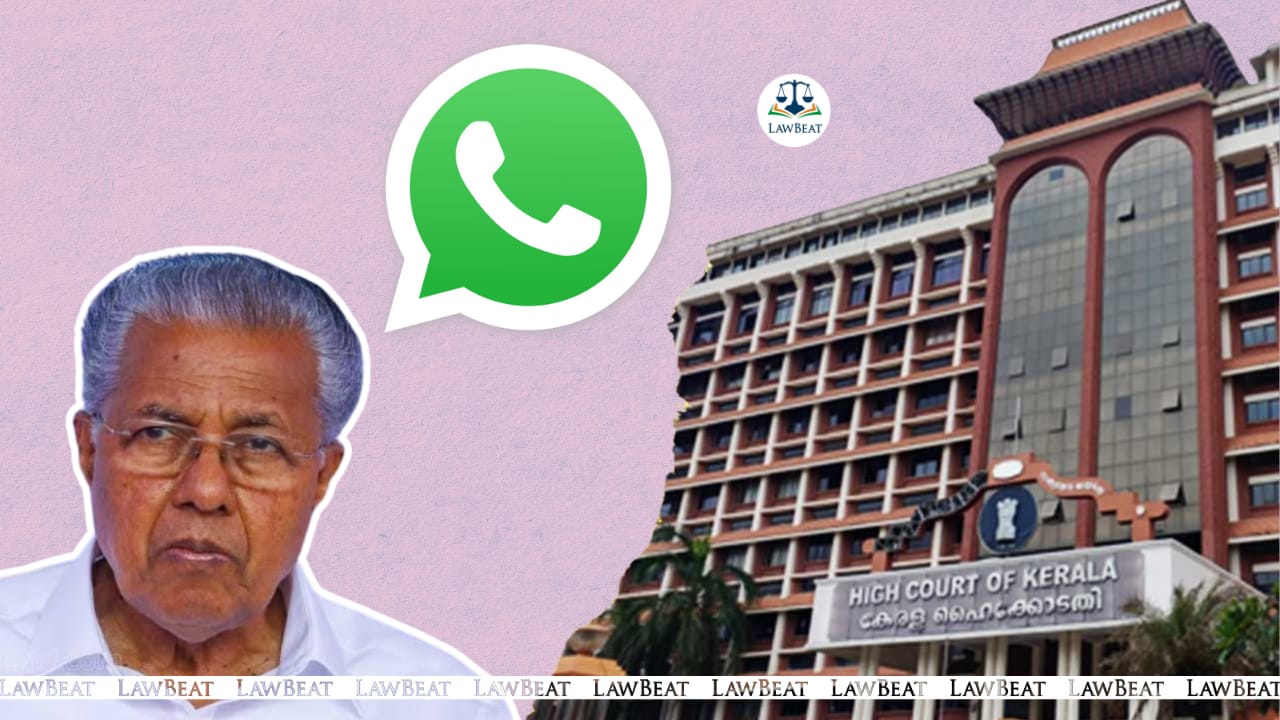Kerala HC Quashes Case for WhatsApp Criticism of CM For Demanding to Donate One Month Salary for Flood Relief

The petitioner had criticised the CM stating that he has to reduce expenditure and show role model and thereafter make advices for donation of salary
The Kerala High Court has quashed the criminal proceedings initiated against a government employee, for allegedly posting controversial comments in a WhatsApp group criticising the Chief Minister Pinarayi Vijayan’s appeal for a one-month salary contribution to the Kerala Flood Relief Fund by government employees.
The petitioner, Jamal, was employed as the Outlet Manager of a SupplyCo store in Kasaragod. On August 27, 2018, he posted a comment in a WhatsApp group comprising SupplyCo employees, wherein he critiqued the Chief Minister's appeal for salary donations. The sarcastic comment, which included the Chief Minister’s photo and referenced alleged governmental expenditure, suggested that the government should adopt austerity measures before soliciting public contributions. The WhatsApp post allegedly stated, “Malayalees will happily donate their monthly salary for the State but you have to reduce the expenditure.” The post concluded with the remark that the “Chief Minister has to show role model and thereafter make advices.”
On the basis of these comments, the petitioner was accused of violating service discipline by publicly criticising government policies, thereby alleging disobedience to the law under Sections 166 (public servant disobeying law to cause injury) and 167 (public servant framing an incorrect document with intent to cause injury) of the Indian Penal Code (IPC).
A Single judge bench comprising Justice G. Girish, examined the definition of disobedience of lawful directions by a public servant under Section 166 of the IPC and identified the essential ingredients constituting the offence as follows:
- The offender must be a public servant at the time the offence was committed.
- The offender must have knowingly disobeyed a lawful direction regarding their conduct as a public servant.
- Such disobedience must have been committed with the intention to cause injury to any person, or with the knowledge that it was likely to cause injury.
With regards the applicability of Section 166 to the present case, the court acknowledged that such disobedience could constitute a breach of service discipline. However, it found no evidence indicating the disobedience was intended to or likely to cause injury to any person. Referring to the inclusive definition of “person” under Section 11 of the IPC, which includes companies and associations, the court concluded that the scheme and context of the IPC do not encompass the government within its definition of “person.”
The court further stated that the comments, made in a private WhatsApp group, could not reasonably be interpreted as intending to cause harm to beneficiaries of the flood relief fund. Thus, negating the applicability of Section 166.
“The opening words of that comment itself show that the people of Kerala would wholeheartedly give their monthly salary for the land, but there shall be austerity measures on the part of the Government to reduce the expenditure. Thus, it is not possible to say that a person reading the above comment would be motivated to avoid payment of his monthly salary to the Flood Relief Fund. In that view of the matter , it cannot be said that the act of the petitioner making the above post in the whatsapp group of the employees of SupplyCo in Kasaragod, was intended to cause injury to any of the beneficiaries of the Flood Relief Scheme. That being so, the offence under Section 166 of the Indian Penal Code is manifestly not attracted in the facts and circumstances of the case,” the court observed.
The court also pointed out that Section 167 IPC pertains to public servants responsible for preparing or translating documents or electronic records, who do so incorrectly with the intent to cause injury. “The facts and circumstances of this case are no way related to the preparation or translation of any such document or electronic record by the petitioner , as part of his official duty, in a manner to be incorrect, with the intention to cause injury to any person. Therefore, there is absolutely no applicability of Section 167 I.P .C in the instant case,” the court noted.
As a result, the court ruled that “offences under Sections 166 and 167 IPC are prima facie not attracted.” Consequently, the criminal proceedings against the petitioner, pending before the Judicial First Class Magistrate Court, Kasaragod, were quashed.
However, the court clarified that these findings do not preclude any departmental proceedings that may arise from the petitioner’s conduct in posting critical comments on the government’s policies and decisions in a WhatsApp group.
Cause Title: Jamal v State of Kerala [CRL.MC NO. 2022 OF 2019]
